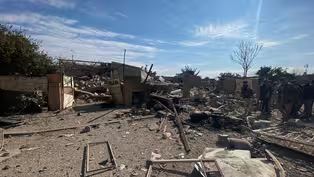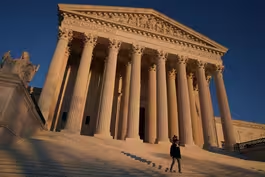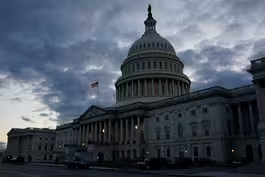
Experts discuss Gaza cease-fire negotiations
Clip: 2/7/2024 | 10m 44sVideo has Closed Captions
Experts discuss Gaza cease-fire negotiations as Netanyahu rejects Hamas' latest terms
Israeli Prime Minister Benjamin Netanyahu rejected a counterproposal from Hamas that would have paused the war in exchange for releasing Israeli hostages over the next few months. The U.S. has hoped a pause could spark broader regional diplomatic progress. Nick Schifrin examines the state of diplomacy with Marwan Muasher and Dennis Ross.
Problems playing video? | Closed Captioning Feedback
Problems playing video? | Closed Captioning Feedback
Major corporate funding for the PBS News Hour is provided by BDO, BNSF, Consumer Cellular, American Cruise Lines, and Raymond James. Funding for the PBS NewsHour Weekend is provided by...

Experts discuss Gaza cease-fire negotiations
Clip: 2/7/2024 | 10m 44sVideo has Closed Captions
Israeli Prime Minister Benjamin Netanyahu rejected a counterproposal from Hamas that would have paused the war in exchange for releasing Israeli hostages over the next few months. The U.S. has hoped a pause could spark broader regional diplomatic progress. Nick Schifrin examines the state of diplomacy with Marwan Muasher and Dennis Ross.
Problems playing video? | Closed Captioning Feedback
How to Watch PBS News Hour
PBS News Hour is available to stream on pbs.org and the free PBS App, available on iPhone, Apple TV, Android TV, Android smartphones, Amazon Fire TV, Amazon Fire Tablet, Roku, Samsung Smart TV, and Vizio.
Providing Support for PBS.org
Learn Moreabout PBS online sponsorshipHamas that would have paused the war in exchange# for releasing Israeli hostages over the next## few months.
But U.S. Secretary of State Antony# Blinken said there was still room for negotiation.
Nick Schifrin examines the state of diplomacy# and what it means for U.S. efforts in the region.
NICK SCHIFRIN: At a press# conference in Jerusalem today,## Netanyahu reiterated his longstanding g the Israel Defense Forces could achieve that# goal in -- quote -- "a matter of months."
BENJAMIN NETANYAHU, Israeli Prime Minister# (through translator): The continuation of## the mi Surrendering to Hamas' delusional demands# that we heard now not only won't lead to## freeing the captives.
It will just invite# another massacre.
It will invite a major## disaster on the state of Israel that none# of our citizens would want to accept.
NICK SCHIFRIN: The original proposal# called for a six-week pause to release## older women and children first and# then a promise of two more re including soldiers and the bodies# of hostages who died in captivity.
Hamas' counterproposal goes further, demanding# an Israeli withdrawal first from populat areas and then from Gaza completely.
It# also demands reconstruction, more than## 500 humanitarian aid trucks per day, and the# understanding that Hamas would remain in power.
The U.S. has hoped a pause in the war could spark# broader regional diplomatic progress.
Today,## Secretary of State Antony Blinken said# talks over the hostages would continue.
ANTONY BLINKEN, U.S. Secretary of# State: While there are some clear## nonstarters in Hamas' response, NI CK SCHIFRIN: Netanyahu made clear the war would# continue.
He said Israel had so far killed 20,000## Hamas fighters, and the Israeli military operation# would extend into the southern city of Rafah,## where more than half of Gaza's 2.3# million people are now sheltering.
So, where do things stand?
For that, we g prime minister from 2002 to 2005.
He's# now vice president for studies at the## Carnegie Endowment for International# Peace.
And Dennis Ross was a longtime## Middle East peace negotiator for both# Republican and Democratic administrations.## He's now a distinguished fellow at the# Washington Institute for Near East Policy.
Thank you very much, both of you.# Welcome back to the "NewsHour."
Dennis Ross, let me start with# you.
What is your reaction what Prime Minister Netanyahu said in# response to Hamas' DE NNIS ROSS, Former U.S.
Envoy to Middle East:# I think he really had two audiences in mind.
One audience was Yahya Sinwar, who is# th and actually is the person in control in# Gaza.
And the other audience was probably## the right wing of his own coalition, where# he's -- he knows they're threatening to break## the government if he looks like he's prepared# to end the war or give in too much to Hamas.
So I think, for Sinwar, what# he wanted to signal was, look,## you're asking to end the war and you stay in# power?
No way.
Not Netanyahu's way of beginning a readiness# to signal that he's going to negotiate,## but he's going to negotiate hard.
And I would# say the Hamas proposal, counterproposal,## is itself a kind of first counterproposal# designed to produce a negotiation.
I don't think there was any Hamas expectation that# the Israelis would accept something like this.
NICK SCHIFRIN: Marwan Muasher, is# this a signal that Netanyahu is## going to negotiate, even if it is negotiate hard?
MARWAN MUASHER, Former Jordanian Foreign# Minister: Well, look, if Netanyah the war will not end until he kills the Ha why should they agree to release hostages# and then agree to a truce of whatever,## two months, three months, and then# after that they get bombed again?
So, if this is the real position of Mr.# Netanyahu, then I'm afraid that this is## a nonstarter.
Secretary Blinken talked# about the Palestinian position being a## nonstarter.
I see the Israeli one being a# nonstarter if this is the real position.
I think the priority today has to be# an end, a permanent end to the war.## After 27,000 people killed, one cannot keep# talking about truces that are not permanent.
NICK SCHIFRIN: Dennis Ross, is this Netanyahu's# actual position, or is this a public stance?## And does this doom any effort to end# the war in Gaza, even if temporarily?
DENNIS ROSS: Look, I do think# it's a negotiating posture,## but I also think that we really have two --# at this point, two Th e Hamas position, as Marwan just suggested, is,## they want an end to the war and they want to# remain in power.
And the Israeli at the end of the day, Hamas# is not going to be in power.
I do think what the actual position# should be, at least on the Israeli si should be the demilitarization of Gaza# and the certainty that it can't re militarized.
I also think you can say you# can tie reconstruction to demilitarization,## something the Israelis are in the process# of doing.
No one is going to be able to## eliminate Hamas, partly because it's# an idea, partly because it's a pa rtly because in some ways it's embedded, at# least sociologically, psycholo But Hamas not being in power, Hamas being# demilitarized, Gaza being demilitarized,## those are objectives, I think, that could be# achieved.
And I think, if the focus turns to that,## then the gaps between the two sides, which# seem so irreconcilable, might be reachable.
NICK SCHIFRIN: Marwan Muasher, is there a version# of Gaza in the future that has Hamas not in pow MARWAN MUASHER: I don't think Gaza is the endgame,## Nick.
The endgame has to be# the end of the occupation.
If we talk about the package where the# endgame is the end of the occupa and the establishment of a Palestinian# state, a lot of these questions that are## difficult to answer today become easier to# answer.
Are we serious about finally ending## the occupation and establishing a two-state# solution, as the United States says it is?
In the end, Hamas has to become a political# force.
We have seen this with the IRA in## Ireland.
We have seen this in many countries# across the world.
We have seen organizations## that were called terrorists, but that# became political forces in the end.
Look, today, the Palestinian polls are# clear.
Sixty percent of Palestinians in## the West Bank and Gaza want Hamas# to stay in Gaza and rule over Gaza## after the war.
These are numbers that# cannot be ignored.
The question is,## how do we give these people a political horizon,# so that they do not believe in armed resistance,## but they do believe that finally a process# can lead to the end of the occupation?
NICK SCHIFRIN: Dennis Ross, let's use that# occasion to zoom out.
So what the U.S. theory## of the case right now is that a temporary# pause could lead to larger discussions exactly what Marwan Muasher just said, Gaza# reconstruction, the future governance of Gaza,## and then normalization between Israel and# Saudi Arabia, leading to a two-state solution.
Is that the correct approach that# the Biden administration is taking?
DENNIS ROSS: I think it is a logical one,# and I think it could be the right one.
Obviously, it's not just that the devils# are in the details.
The Israeli pu was traumatized by October 7.
They fear, when# you talk about a Palestinian state, t will come to dominate that state, and Hamas, by# definition, doesn't accept the two-state outcome.
And this is not just a recent phenomenon.
This# was the case throughout the 1990s.
Every time we## were making progress, we got a Hamas bomb.# There is an ideology in Hamas that rejects## Israel's existence.
The question is, do you# have a Palestinian national movement that,## in the end, will be dominated by those and who# will demonstrate they're dominated and control## the movement that is prepared to live with# Israel as a nation-state of the Jewish people?
If that becomes very clear, then you# can get a Palestinian state.
You're## not going to have peace until you have an# end of occupation.
But there's got to be## responsibility and accountability on both# sides.
On the Israeli side, they're going## to have to demonstrate they're prepared to# live with an independent Palest But the Palestinians are also going to have to## demonstrate that they re NICK SCHIFRIN: Marwan Muasher, is there# Palestinian leadership that the U.S. and the## region is working on today that could foresee that# future that Dennis Ross just MA RWAN MUASHER: Of course.
Of course.
One of them is in pris NICK SCHIFRIN: Marwan Barghouti, whom Israel tried# and convicted of terrorism charges 20 years ago,## but maintains his political viability and is one# of the most popular Palestinian leaders today.
MARWAN MUASHER: Absolutely.
I Cabinet today that are openly calling for# the expulsion of Palestinians?
Ideologies## exist on both sides.
We need to change the# mind-sets of both Israelis and Palestinians,## who today do not believe there# is a partner on the other side.
And the only way we can change the mind-set# is if we offer a serious process, not an## open-ended process, but a serious process# that ends the occupation.
If we do that,## I believe we can change the mind-set of both# Palestinians and the Israelis.
But, today, we## cannot have the extremist ideologies once again on# both sides dictate the outcome of this conflict.
NICK SCHIFRIN: If I could# ask quickly, both of you,## to turn to an incident this Th e U.S. military has announced that it# took a drone strike the leaders of Kataib Hezbollah, one of the# pro-Iranian militias, in Iraq responsible for## the deaths of three U.S. service members,# U.S. military saying that it killed the## commander -- quote -- "responsible for directly# planning and participating" in that a Dennis Ross first, could this kind of attack## end attacks by pro-Iranian militias on# U.S. service DENNIS ROSS: It's clear that the administration# has made a decision that one of the things it has## to do is that a threshold was crossed# when three Americans were killed.
And then, when that happens, the American# response is going to be disproportionate to## what we saw before.
The U.S. is clearly trying# to change the calculus by showing those are doing this are playing with fire.
Is this# going to be sufficient to do it?
I'm not sure.
NICK SCHIFRIN: Marwan Muasher, does this kind# of strike -- quote -- "change the calculus"?
MARWAN MUASHER: I still think# that both the United States and## Iran are not interested in widening the conflict.
I think that what we have seen so far,# both from Iran and from the United States,## are tactical engagements.
But I do not# think that they are going to amount to## a widening of the conflict.
And# I certainly hope they don't.
NICK SCHIFRIN: Marwan Muasher, Dennis# Ross, thank you very much to yo DENNIS ROSS: Thank you.
A Brief But Spectacular take on building a team
Video has Closed Captions
Clip: 2/7/2024 | 2m 58s | A Brief But Spectacular take on building a team (2m 58s)
Manchin says immigration deal fell apart because of politics
Video has Closed Captions
Clip: 2/7/2024 | 8m 22s | Sen. Manchin criticizes colleagues, says immigration deal fell apart 'because of politics' (8m 22s)
Militia hit by U.S. claims it didn't attack American troops
Video has Closed Captions
Clip: 2/7/2024 | 7m 42s | Militia hit by U.S. airstrikes in Iraq claims no connection to attacks on American troops (7m 42s)
Nick Clegg on the challenges of AI content, misinformation
Video has Closed Captions
Clip: 2/7/2024 | 7m 26s | Meta's Nick Clegg on the challenges of AI content and misinformation (7m 26s)
Supreme Court to decide if Colo. can block Trump from ballot
Video has Closed Captions
Clip: 2/7/2024 | 5m 21s | Supreme Court to decide if insurrection clause can block Trump from Colorado ballot (5m 21s)
What's next for border after GOP blocks bipartisan bill
Video has Closed Captions
Clip: 2/7/2024 | 6m 13s | What's next for border policy, Ukraine aid after Senate Republicans block bipartisan bill (6m 13s)
Providing Support for PBS.org
Learn Moreabout PBS online sponsorship
- News and Public Affairs

FRONTLINE is investigative journalism that questions, explains and changes our world.

- News and Public Affairs

Amanpour and Company features conversations with leaders and decision makers.












Support for PBS provided by:
Major corporate funding for the PBS News Hour is provided by BDO, BNSF, Consumer Cellular, American Cruise Lines, and Raymond James. Funding for the PBS NewsHour Weekend is provided by...





